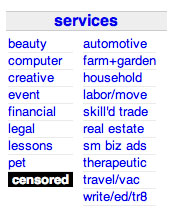No more adult services on Craigslist: 1st Amendment issue or business decision?

It's finally happened. After years of mounting concern over the relatively blatant advertisement of prostitution on Craigslist, the company has finally decided to stop accepting ads for "adult services". That's roughly $36 million worth of annual business to which Craigslist was arguably entitled by its First Amendment rights. So what pushed the company over the edge? Is this a precedent-setting decision or did one company simply decide to eliminate a source of potential liability?
Here's what the Services section of the Craigslist homepage looks like tonight:
Is it just me, or does their choice of presentation smack of duress? The folks over at PC Magazine agree:
In regards to the [paid adult services listings], the aforementioned $36 million estimation would have made up roughly one-third of the company's total yearly revenue. That's quite a chunk of change for Craigslist o just give away—especially when it's labeled as "censorship" instead of a simple, silent removal.
Last month, the San Francisco Chronicle ran an interview with Craigslist chief executive, Jim Buckmaster, whose words definitely suggested that his company wasn't planning to pull the site:
"Is moving advertising around our best hope for addressing these harms?" he said. "Then the ads fall under personals, and how long before the demand is that we shut down personals? And where do those ads go next? What other sections of our site would they like us to shut down?"
Interestingly, only US visitors see the "censored" label. The site, which many US legislators, attorneys general, and human rights organizations have repeatedly tied to the exploitation and abuse of children and women, is still active and accessible from outside the States. Craigslist isn't commenting on the move, nor on its long-term plans for any adult services listings or its ultimate motivation for censoring the site in the US. However, most analysts felt that as a small company, Craigslist simply didn't have the financial resources to handle the lawsuits that were just around the corner.
While the Digital Millenium Copyright Act protects sites from liability over the actions of its users, stepping into the territory of child sex trafficking suddenly gives the DMCA (and the First Amendment) less teeth. No matter what legal protections it may or may not have had, what growing, profitable company wants to be at the forefront of a high-profile non-consensual sex trade case? (No, there isn't a case like that yet involving Craigslist, but perhaps it was only a matter of time).
Poking around the site a bit more, one has to wonder if Buckmaster's and other activists fears will be realized. This message appears in the personals section:
Probably not.
While this may be a business decision for Craigslist, it calls into question the extent to which a wide variety of sites are protected by both the DMCA and the First Amendment. It also begs for legislation and a law enforcement system equipped to deal with the countless bad guys hanging around the more dimly lit corners of the Web that still protects our rights to a free, open Internet.
